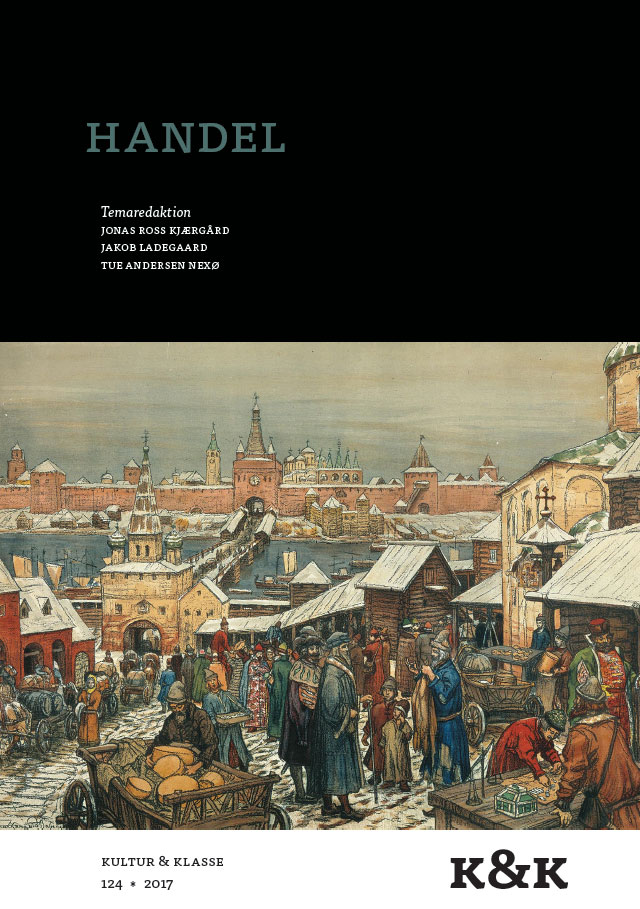”handelens regulære vej”: Aktieselskabet mellem handel og spekulation i Trollopes The Way We Live Now, 1875
DOI:
https://doi.org/10.7146/kok.v45i124.103916Nøgleord:
handel, finansiel spekulation, finansiel kriminalitet, aktieselskaberResumé
This article applies a historical formalist method to analyze a literary response to the late nineteenth-century financial sector in England: Anthony Trollope’s The Way We Live Now, 1875. The central issue in the novel is the legal and conceptual boundary between traditional commerce and financial speculation, and the variety of ways in which established social forms and hierarchies are challenged by a rapid introduction of new forms of financial activity such as joint-stock corporations and limited liability. Trollope’s novel is concerned with the contradictions inherent in the concept of trade and commerce in this transformed financial context, and devotes critical attention to the ways in which these new forms collide in the individual lives and ambitions of its characters. Drawing on a recent theory of form by Caroline Levine, the article demonstrates how this literary representation of the accelerating financial sector should not simply be seen as reflections of an economic context in turmoil. Rather, the article argues that Trollope applies the affordances of economic and financial forms in what is essentially an interpretative gesture, directed at the only partially visible and constantly changing reality of financial capitalism and modern corporate law.
Referencer
Dick, Alexander. Romanticism and the Gold Standard: Money, Literature, and Economic Debate in Britain 1790-1830. Basingstoke: Palgrave Macmillan, 2013.
Johnson, Paul. Making the Market: Victorian Origins of Corporate Capitalism. Cambridge: Cambridge University Press, 2010.
Kornbluh, Anna. Realizing Capital. Fordham University Press, 2014. ProQuest Ebook Central. https://ebookcentral-proquest-com.ez.statsbiblioteket.dk:12048/lib/asb/detail.action?docID=3239850.
Levine, Caroline. Forms. Princeton: Princeton University Press, 2015.
Mokyr, Joel. The Enlightened Economy: An Economic History of Britain, 1700-1850. New Haven & London: Yale University Press, 2011.
Nicholson, Colin. Writing and the rise of finance: Capital satires of the early eighteenth century. Cambridge: Cambridge University Press, 1994.
Palgrave, R. H. Inglis (Ed.). Dictionary of Political Economy (vol. I). London: Macmillan and co., 1894.
Poovey, Mary (Ed.). The Financial System in Nineteenth-Century Britain. New York & Oxford: Oxford University Press, 2003.
Robb, George. White-Collar Crime in Modern England: Financial Fraud and Business Morality, 1845-1929. Cambridge: Cambridge University Press, 1992.
Rowlinson, Matthew. Real Money and Romanticism. Cambridge: Cambridge University Press, 2010.
Russell, Norman. The Novelist and Mammon: Literary Responses to the World of Commerce in the Nineteenth Century. Oxford: Clarendon Oxford Press, 1986.
Scorsese, Martin (et al). The Wolf of Wall Street. Paramount Pictures, 2013.
Taylor, James. Creating Capitalism: Joint-Stock Enterprise in British Politics and Culture, 1800-1870. Woodbridge, Suffolk: The Royal Historical Society, The Boydell Press, 2006.
Taylor, James. Boardroom Scandal: The Criminalization of Company Fraud in Nineteenth-Century Britain. Oxford: Oxford University Press, 2013.
Trollope, Anthony. The Way We Live Now. ed. Francis O’Gorman, Oxford: Oxford University Press, 2016.
Trollope, Anthony. An Autobiography and other Writings. Ed. Nicholas Shrimpton, Oxford: Oxford University Press, 2014.
Vogl, Joseph. The Specter of Capital, (transl. Joachim Redner & Robert Savage), Stanford, CA: Stanford University Press, 2015.
Wagner, Tamara S. Financial Speculation in Victorian Fiction: Plotting Money and the Novel Genre, 1815-1901. Columbus: Ohio State University Press, 2010.
Weiss, Barbara. The Hell of the English: Bankruptcy and the Victorian Novel. Lewisburg: Bucknell University Press, 1986.
Downloads
Publiceret
Citation/Eksport
Nummer
Sektion
Licens
Tidsskriftet følger dansk ophavsret.





